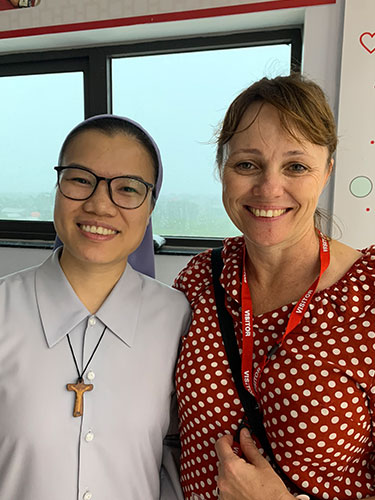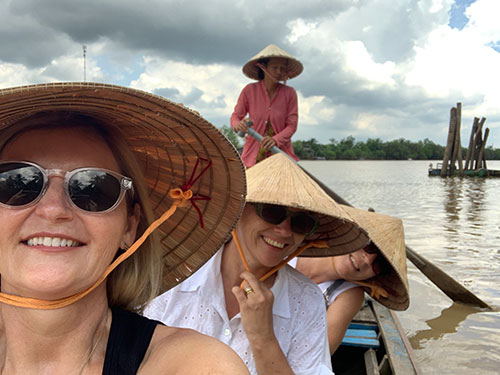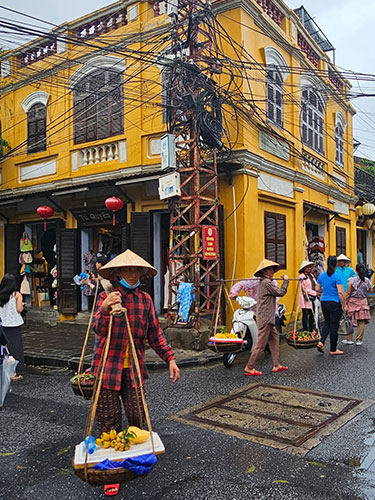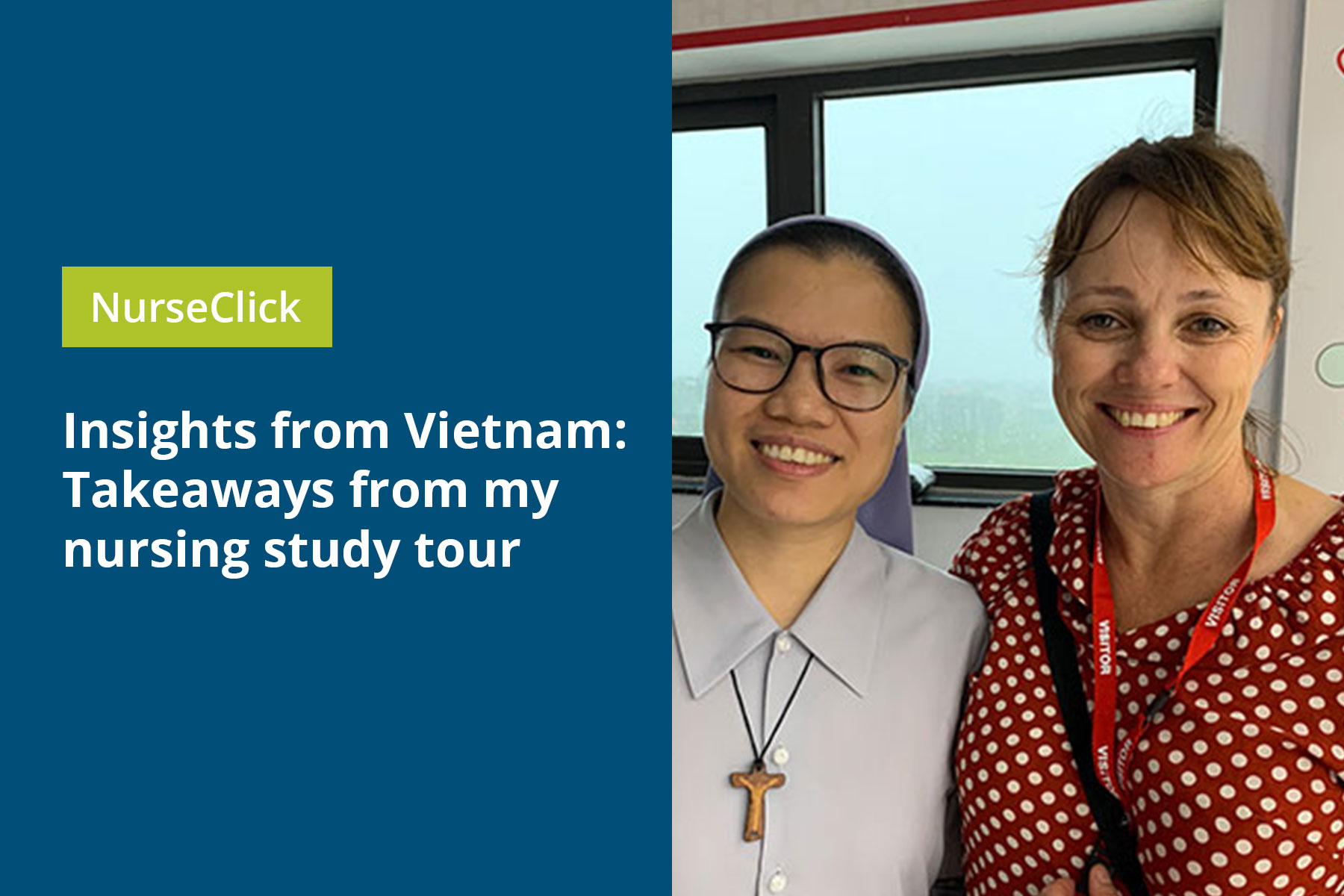In October 2023, Tracey Pattie MACN embarked on the ACN Study Tour to Vietnam with a cohort of Australian nurses and healthcare professionals, an experience made possible through a scholarship from the ACN Foundation. The two-week trip provided a deep dive into the vibrant cultural and healthcare landscape of Vietnam. Participants engaged with the local healthcare community, visiting a variety of hospitals and clinics, and gained a profound understanding of the unique challenges and practices in Vietnamese healthcare. The tour was not just about professional growth; it also offered a rich exploration of Vietnam’s historical and cultural tapestry. The trip was a horizon-expanding venture, significantly enriching the attendees’ professional and personal growth.
In this article:
- What motivated you to apply for the ACN Nursing Study Tour Scholarship?
- In what ways did your experience in Vietnam improve your leadership skills and how will you apply what you have learned to your ongoing work?
- What did you learn about the healthcare system in Vietnam and how it compares to Australia?
- What were some of the cultural highlights on the tour?
- Does any one experience stand out for you?
- What would you say to anyone thinking of applying for this scholarship?
What motivated you to apply for the ACN Nursing Study Tour Scholarship?
I had hoped to go to South Africa in 2022; however, a glitch with what I thought was the back button on my application turned out to refresh the page. This error ended my application at the final hour when it was due. I made a commitment to myself, that no matter what, I would apply in 2023.
In what ways did your experience in Vietnam improve your leadership skills and how will you apply what you have learned to your ongoing work?
Throughout our time visiting healthcare facilities in Vietnam, it was obvious that they wanted support from us to improve the knowledge base of nurses. At each visit, we presented ourselves professionally and aimed to talk with staff about their healthcare system, what works well, and what needs improvement. Utilising my existing leadership skills, I easily engaged in these conversations – when English allowed. However, my leadership skills will be further enhanced by this experience. I plan to use the information gathered and find ways to work with the Vietnamese healthcare system to support their learning.I have made contacts at Vinmec Private Hospital and Kim Chong Charity Clinic. I am hoping to maintain contact, be a resource person for what they may need, and offer learning support for their staff as needed. I am also hoping that I can take what I have learned from the Vietnamese health system back to my team of staff, to demonstrate the value of gratefulness, working with less and encouraging family to stay where possible – making this business as usual, not something extraordinary.

What did you learn about the healthcare system in Vietnam and how it compares to Australia?
During my visit to Vietnam, I had the privilege of exploring various healthcare facilities, each unique in its approach and structure. My journey included a top private hospital, one of the country’s largest public hospitals, a traditional medicine hospital, and a charity health clinic run by nuns.
I discovered some intriguing facts during my visits. For instance, the nurse-to-patient ratio at the private hospital was an impressive 1:4, while the public hospital had a strikingly different ratio of 1:23. In the NICU, the ratio stood at 1:6. An interesting aspect of the public hospital is that despite offering services, medications and consumables still require payment. A notable cultural practice is that family members stay with their hospitalised loved ones, regardless of age, assisting in their care until discharge.
The bed occupancy rate in the public sector is an overwhelming 132 per cent. Nurses work hard, with a minimum 44-hour week, and their shifts can be quite varied, ranging from 8, 12, 16, to even 24-hour shifts. They are only entitled to two weeks of annual leave per year. In a remarkable initiative, the Vietnamese Government funds a Traditional Medicine Hospital in every district of every city, covering 80 percent of the costs. These hospitals offer both Western and Traditional medicine, with an average LOS of 28 days!
Medical staff in Vietnam are highly trained and skilled, often receiving training in international hospitals. However, nursing as a profession is perceived quite differently. Currently not viewed as an aspirational career, there’s hope to change this perspective by offering formal education to nursing staff.
Despite the challenging ratios and tough working conditions, what stood out the most to me was the evident happiness of the staff and the deep gratitude of patients and their families for the care received. It was genuinely heartwarming to witness. It’s important to note that not all patients can afford public hospitals, leading to the necessity of charity clinics and the reliance on Traditional Medicine Hospitals. To put things into perspective, the average wage in Vietnam is approximately $3,700 AUD per year.
What were some of the cultural highlights on the tour?
Where do I start?
One of the most spiritually resonant places for me was the Temple of Literature. The profound respect for learning there was incredible. It was fascinating to learn that Vietnam celebrates International Teachers Day as a public holiday, where people of all ages present gifts like flowers or books to their current or past teachers as a token of gratitude for the ‘gift of education.’
Another highlight was the Hue Citadel, which once housed Vietnam’s last royal family. This site, with its battle scars dating back to the Tet offensive during the Vietnam War, spans an expansive 40 acres, rich in history.
I was also deeply moved by the visit to the Kim Chong Charity Health Clinic in Hue. Run by a dedicated and fun-loving group of nuns, this clinic offers 100 percent free healthcare, blending traditional and Western medicine. The nuns’ warm welcome and their excitement about our visit was heartening. This place struck me as an excellent opportunity for volunteer work, and I’ve already made contacts for future engagements.
Despite the torrential rain, the cultural vibrancy of Hoiyan, a small city with a population of just 1 million compared to Saigon’s 11 million, was undampened. A memorable part of this visit was a boat ride across the Bon River to the village of Kim Bong, home to 100 families sustaining themselves through small-scale farming.

The tour was also a culinary journey, thanks to our guide who introduced us to an array of amazing food experiences. From home-cooked meals, dining with local families, traditional restaurants, sharing meals with Vietnamese nurses, to engaging in cooking classes, each meal was an adventure in itself.
A day trip to the Mekong Delta was another standout experience. A canoe ride took us to a village where we were treated to traditional delicacies like cocoa, rice, and snake wine, followed by a traditional lunch.
Learning about the history of the Vietnam War was enlightening, especially understanding that the Vietnamese people choose not to harbour grudges but rather move forward with life. This resilience was inspiring.
The incredible work ethic of the Vietnamese people was evident everywhere we went. In a country with no welfare system, work is essential for survival. The religious and philosophical beliefs of the population, with 60 per cent Buddhist, 20 per cent Catholic, and 20 per cent atheist, are not just professed but are vividly demonstrated in their daily actions.
Navigating the roads was an adventure in itself. In Hanoi, road rules exist but are loosely followed, while in Saigon, when roads are packed, motorbikes simply take to the footpaths!
And, of course, I can’t forget the Egg Coffee, with the best one I tasted being from Hanoi. This unique beverage was just one of the many delightful and surprising aspects of Vietnamese culture that made the tour an unforgettable experience.
Does any one experience stand out for you?
Our visit to the Kim Chong Charity Clinic was the highlight of my trip. The nuns were special, dedicated to their cause, and lifelong commitment to providing health care to those less fortunate. Their happiness and excitement for what they do is palpable. Sister Uyen Le and I are keeping in contact via social media, and I am planning how our Health Service can support the clinic in some small way.
Also, our visit to the village of Kim Bong, where we met the beautiful people practising trades that will soon no longer exist as the younger generations are no longer interested. In general, Vietnam stood out for me – the people, the culture, their way of life, and their gratefulness – so different from what we experience in Australia.

What would you say to anyone thinking of applying for this scholarship?
Do it! Don’t even think about it. I had the pleasure of meeting and getting to know 15 nurses and one GP. Through this journey, I’ve forged connections with individuals whose paths I might never have crossed otherwise. These encounters have enriched my perspective in unexpected ways. Additionally, the opportunity to explore a country like Vietnam, a destination I might not have chosen to visit on my own, has been a revelation.
And finally, a quote from our wise tour guide: “Holding onto anger is like drinking poison and expecting someone else to die”
Feeling inspired by Tracey’s recount of her experience? Apply now for a scholarship to join our next ACN Study Tour! From 15 to 27 September 2024, we will be embarking on an inspiring journey to Greece and Turkey. To help make this opportunity a reality, the ACN Foundation is proud to offer four $5,000 scholarships. Seize this unique opportunity to enrich your career and broaden your horizons – apply now!
By Tracey Pattie MACN






